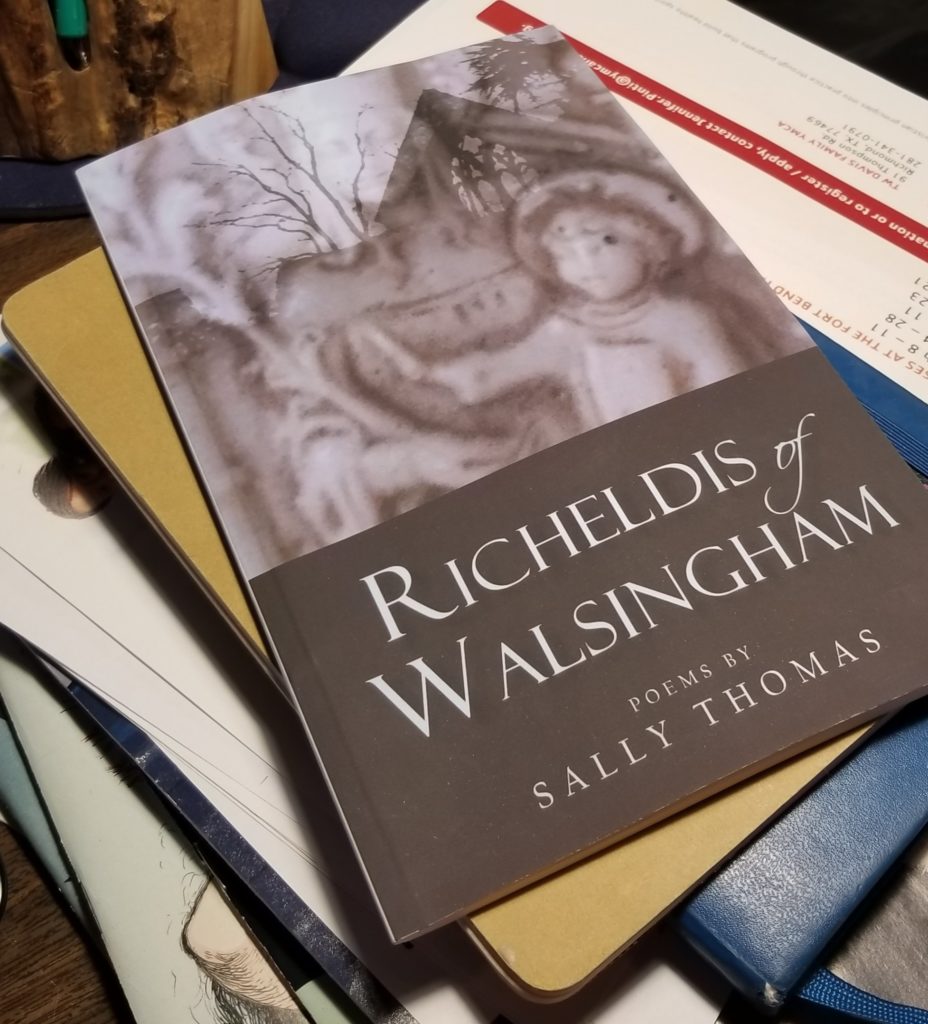I really have no excuse for not knowing about Our Lady of Walsingham.

I live less than hour from the Cathedral of Our Lady of Walsingham, site of the American shrine in honor of this Marian apparition. The cathedral offers a homeschool hybrid program in which several of my friends participate, yet I had never stopped to ask, “huh, why is it called ‘Holy House?'” This reflects poorly on my character.
Thankfully, these deficiencies have been remedied. I finally made my first visit to the cathedral for a poetry reading by Sally Thomas, who has composed a chapbook inspired by the apparition of Our Lady to Richeldis and the subsequent centuries of devotion to this shrine.
The Shrine of Our Lady at Walsingham was established in 1061 when, according to the text of the Pynson Ballad (c 1485), Richeldis de Faverches prayed that she might undertake some special work in honour of Our Lady. In answer to her prayer, the Virgin Mary led her in spirit to Nazareth, showed her the house where the Annunciation occurred, and asked her to build a replica in Walsingham to serve as a perpetual memorial of the Annunciation.
This Holy House was built and a religious community took charge of the foundation. Although we have very little historical material from this period, we know that with papal approval the Augustinian Canons built a Priory (c 1150). Walsingham became one of the greatest Shrines in Medieval Christendom.
Sally spoke to us about “how domestic this vision is,” as Mary gives Richeldis a tour of her house and says “make this in the world.” How profound an experience this must have been! As we heard portions of poems inspired by Richeldis and the pilgrims throughout the centuries, I reflected upon the deep peace that would come from resting in Mary’s home. (I also, truth be told, had the thought that this home must be enormously tidy compared to mine.) Ooohhhh…Holy House…I get it!
I’ve joined Toastmasters (prompting weekly encouragement from my teenz to “master the toast!”), and a common theme of the feedback I have received so far is that I should incorporate more pauses into my speechifying, leaving a little room for myself to breathe and listeners to process what I just said. One of my more egregiously unrehearsed speeches was compared to “sprinting a marathon,” a fair criticism. I congenitally refuse to make cuts when necessary, which is why I thought I could somehow shove nine index cards of bullet points into a six-minute speech.
Simultaneously, I have trained my mind to leap towards interruptions through a rigorous program of phone usage and social media. You, too, can enjoy the jittery life of hopping from one unrelated thought to the next, all in search of dopamine! Just focus on the screen and keep those thumbs nimble; you’ve got to be ready to scroll, click, and swipe!
Sally spoke to us about the difference between reading prose and reading poetry. She compared prose to driving a long distance as efficiently as possible; there’s no time to meander when you have to reach your destination quickly. Poetry, in contrast, is more akin to all of the things you hurry past on your commute. I believe she quoted Laurence Perrine (can’t read my handwriting on my notes; perhaps the poet herself will clear this up for me) in describing the role of the poet as “inviting the reader into some moment of intense living.”
She also discussed the loneliness that Richeldis must have felt after the apparition, that longing for companionship with the Blessed Mother. I think of this with the Ascension, as well, that it must have felt lonely to no longer enjoy Jesus’ presence in that way as a daily companion. I have a new appreciation for Eucharistic adoration for this reason: that I can spend time in Christ’s presence for the sake of spending time at his feet.

As the Annunciation (March 25) approaches, I would encourage you to check out Sally’s book. The poems move backwards through time, with Richeldis herself appearing at different points in the cycle. My favorite is probably the one titled “Richeldis – circa 1080,” which begins:
To sit companionably,To say,
And how is it with you
I also got to sit companionably with Sally over breakfast before she left town; it’s always such a treat to meet a longtime Internet friend! She gamely accommodated my talking incessantly about College Searching and other current preoccupations, although in hindsight I realize I should have allowed for more pauses in the conversation.

Sally Thomas is amazing. Everyone should read Richeldis.